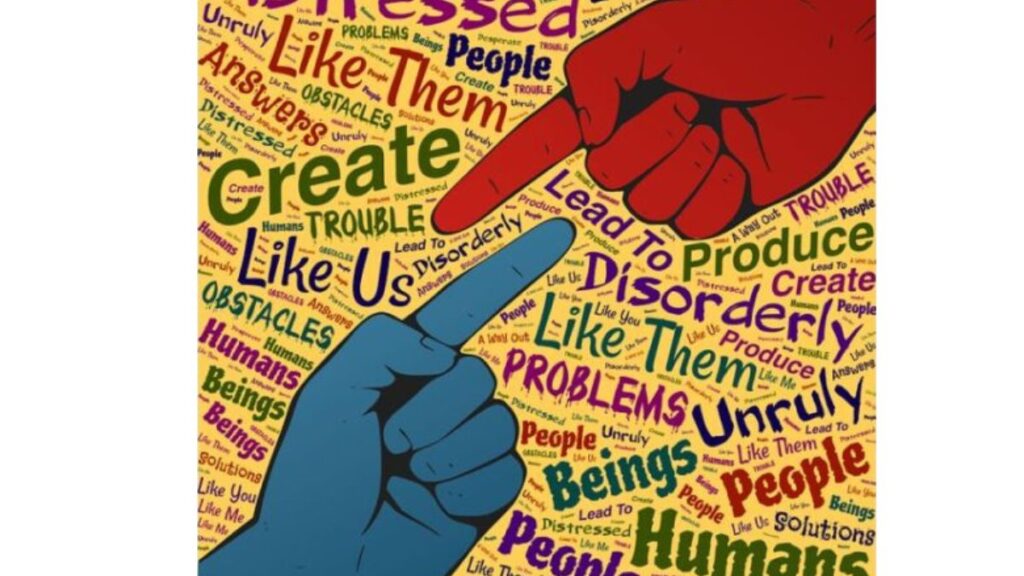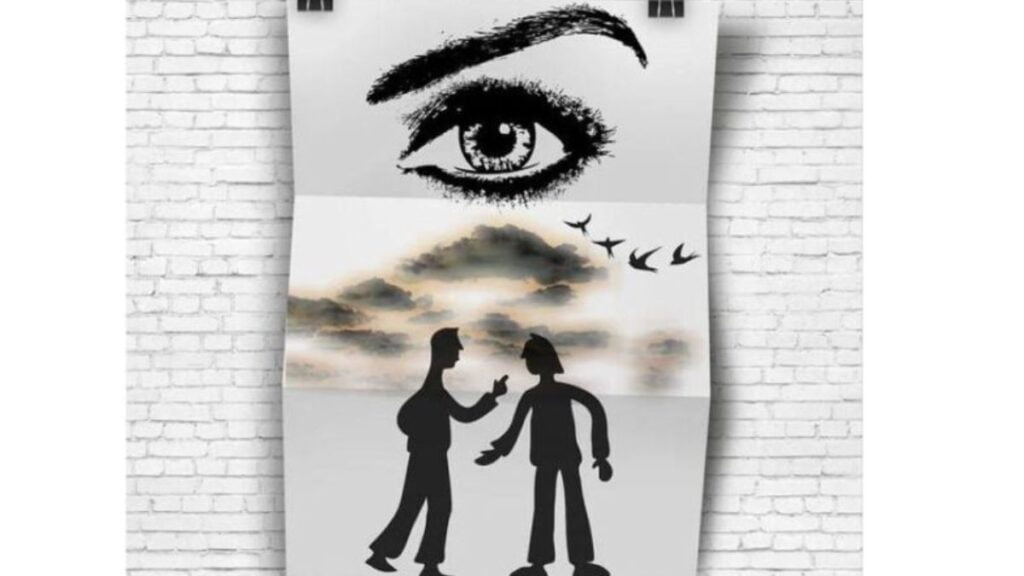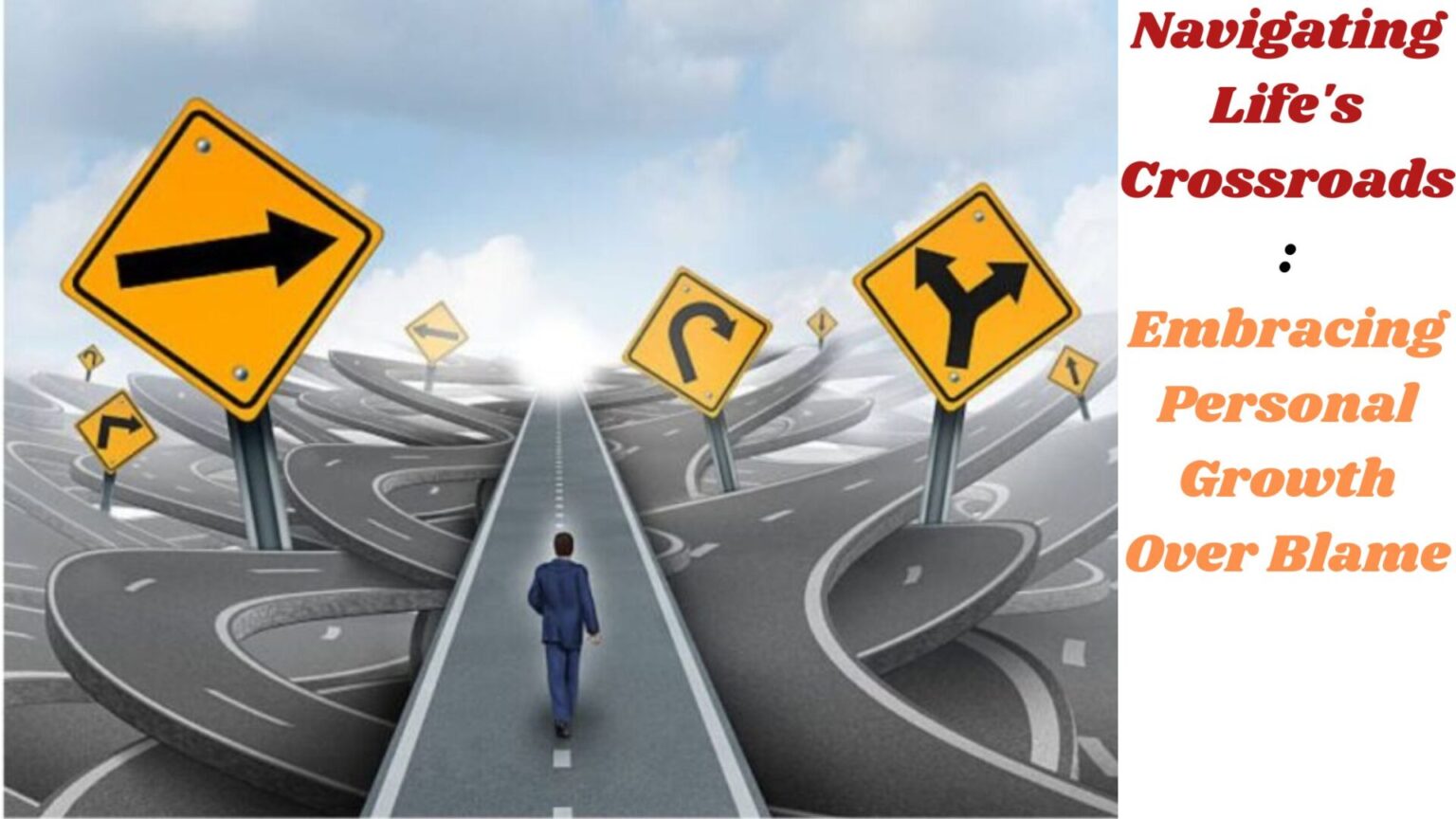Introduction:
Navigating Life’s Crossroads: Embracing Personal Growth Over Blame

In the journey of life, we often find ourselves at crossroads where challenges and setbacks can either become stumbling blocks or stepping stones. In this article, we’ll explore the pivotal choice between assigning blame and embracing personal growth at life’s crossroads.
What factors influence the pivotal choice individuals face between assigning blame and embracing personal growth when navigating life’s crossroads?
- The Blame Game: A Roadblock to Progress At the intersection of difficulties, it’s natural to look for someone or something to blame. However, dwelling on blame can hinder our progress, keeping us stuck in a cycle of negativity.
- Owning Your Narrative: Taking Responsibility Personal growth begins with accepting responsibility for our circumstances. By acknowledging our role, we empower ourselves to make conscious choices and shape our own narrative.
- Learning from Setbacks: Fuel for Personal Development Life’s crossroads offer valuable lessons. Rather than assigning blame, view setbacks as opportunities for learning and personal development. Extracting lessons from challenges propels us toward growth.
- Cultivating a Growth Mindset: The Power Within Embracing personal growth requires adopting a growth mindset. This mindset sees challenges as opportunities, values effort over outcome, and believes in the capacity for change and improvement.
- Building Resilience: A Key to Navigating Life’s Twists Resilience is the ability to bounce back from adversity. Choosing personal growth over blame allows us to build resilience, enabling us to face challenges with strength and determination.
- Setting Goals: Charting a Course for Personal Development Rather than focusing on blame, channel energy into setting meaningful goals. Goal-setting provides direction, motivation, and a clear path for personal development, helping us move forward purposefully.
- Embracing Change: A Constant in the Journey Life’s crossroads often signify change. Choosing personal growth means embracing change willingly, adapting to new circumstances, and using change as a catalyst for positive transformation.
- Seeking Support: A Collaborative Approach to Growth Don’t hesitate to seek support from friends, family, or mentors. Sharing experiences and learning from others can provide valuable insights and encouragement on the path to personal growth.
- Mindfulness and Self-Reflection: Tools for Growth Incorporate mindfulness and self-reflection into your journey. These practices foster self-awareness, helping you understand your reactions, choices, and areas for improvement.
- Celebrating Milestones: Acknowledging Progress As you choose personal growth over blame, celebrate the small victories along the way. Recognizing your progress reinforces the positive changes you’ve made, motivating you to continue on the path of personal development.
- What is the psychology behind blaming people?
What is the psychology behind blaming people?
Blaming others is a complex psychological phenomenon influenced by various factors. Here are some key elements of the psychology behind blaming people:
- Defense Mechanism: Blaming can serve as a defense mechanism to protect one’s self-esteem. By attributing fault to others, individuals may avoid confronting their own shortcomings or mistakes, preserving a positive self-image.
- Attribution Theory: Attribution theory suggests that people tend to attribute causes to events in order to make sense of the world. When facing challenges or failures, blaming others can be a way to externalize the cause and maintain a sense of control.
- Cognitive Biases: Cognitive biases, such as the fundamental attribution error, play a role in blaming. This error involves attributing others’ actions to their character rather than considering external factors. People may overlook situational factors and overemphasize personal traits when assigning blame.
- Self-Protection: Blaming can be a way for individuals to protect themselves from feelings of vulnerability or guilt. It shifts the focus away from one’s own actions, reducing the emotional discomfort associated with acknowledging personal responsibility.
- Maintaining Relationships: In social contexts, blaming may be a strategy to maintain relationships. By attributing negative outcomes to external factors, individuals avoid damaging their social connections. This can be seen as a way to preserve harmony and avoid confrontation.
- Control and Predictability: Blaming provides a sense of control and predictability. By attributing events to specific causes, individuals may feel more in control of their surroundings, even if that means assigning blame to others.
- Emotional Coping Mechanism: Blaming can be an emotional coping mechanism. When faced with distressing situations, individuals may shift the emotional burden onto others as a way to cope with the negative emotions associated with failure or adversity.
- Social Learning: Observational learning and socialization contribute to the tendency to blame. If individuals grow up in environments where blaming is a common response to challenges, they may adopt this behavior as a learned response.
- Communication of Expectations: Blaming can also be a way for individuals to communicate their expectations and standards. By holding others accountable, individuals may express their beliefs about how things should be done and what is deemed acceptable.
Understanding the psychology behind blaming people involves recognizing the interplay of cognitive, emotional, and social factors that contribute to this complex behavior. It’s essential to consider individual differences and the unique circumstances surrounding each situation.
What type of person blames others for everything?
Blaming others for everything can be a behavior associated with various personality traits and psychological tendencies. It’s important to note that individuals are complex, and behaviors can be influenced by a combination of factors. Here are some characteristics often associated with people who tend to blame others excessively:

- External Locus of Control: Individuals with an external locus of control believe that external forces, rather than their own actions, dictate the outcomes in their lives. They may be more inclined to attribute failures to external factors and avoid taking personal responsibility.
- Low Self-Esteem: People with low self-esteem may resort to blaming others as a defense mechanism to protect themselves from feelings of inadequacy. By shifting blame, they attempt to maintain a positive self-image.
- Avoidance of Responsibility: Some individuals have an aversion to taking responsibility for their actions. They may blame others to avoid facing the consequences of their choices or actions.
- Narcissistic Traits: Narcissistic individuals may be more prone to blaming others, as they often have an inflated sense of self-importance and may struggle to accept any form of personal criticism or failure.
- Defensiveness: Defensive individuals may be quick to blame others as a way of deflecting criticism or protecting themselves from perceived threats. This defensiveness can hinder constructive self-reflection.
- Poor Communication Skills: Ineffective communication skills can lead to misunderstandings and conflicts. Individuals who struggle with communication may resort to blaming others instead of engaging in open dialogue to address issues.
- Victim Mentality: People with a victim mentality tend to perceive themselves as constantly being wronged or victimized. Blaming others becomes a way to reinforce their perceived victim status and garner sympathy.
- Insecurity: Insecure individuals may use blame as a way to mask their insecurities. By shifting responsibility, they attempt to maintain a facade of confidence and competence.
- Unresolved Trauma: Individuals who have experienced trauma or significant stress may develop maladaptive coping mechanisms, including blaming others as a way to cope with unresolved emotions.
- Lack of Emotional Intelligence: A lack of emotional intelligence can contribute to difficulty in managing one’s own emotions and understanding the emotions of others. This may lead to a reliance on blame rather than constructive problem-solving.
Conclusion:
Life’s crossroads present a choice – to either succumb to blame or embrace personal growth. By taking responsibility, learning from setbacks, and fostering a growth mindset, you pave the way for a journey filled with resilience, purpose, and continual self-improvement. Remember, at each crossroad, you have the power to choose the path that leads to personal growth and fulfillment.






